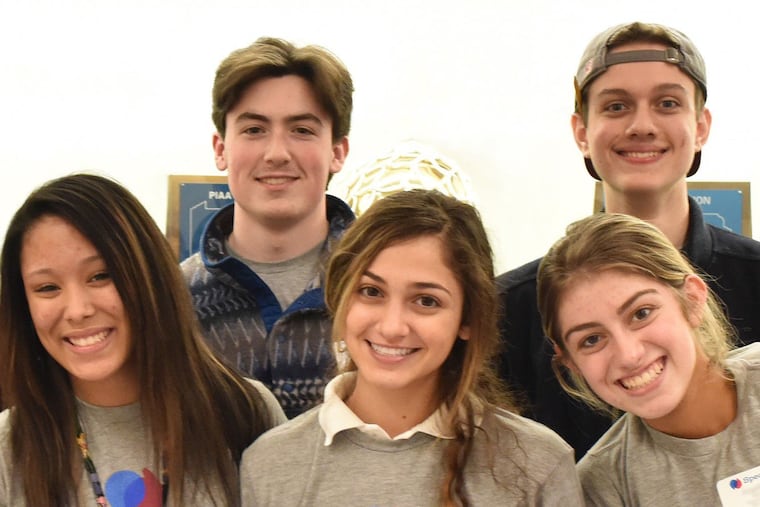SpeakUp! gets teens and parents talking about hard subjects, without judgment
“I didn’t want to come to SpeakUp! – my mom made me. But then I didn’t want to leave.”

In 1980, Bob Gillin Jr. was elected student body president of the Haverford School. He was only a junior, and he performed so well that he was reelected the next year. He was also captain of the crew team, and star of the school play. Outwardly, he was confident and successful.
But inside, he was struggling: with a community he feared would not accept that he was gay; with a family he feared might not, either; and — later — with drugs and alcohol. At age 28, he tested positive for HIV.
“He was more afraid of what people would think of him than he was of dying,” said his sister Martie Bernicker, noting how queerness and AIDS were difficult topics to talk about back then.
“When he knew he was going to die, he said, ‘I really want to start being open, and I want you to talk to the world about what happened with me.’ So we did. We tried to set the tone for families about how to be authentic with each other in the face of a difficult situation.”
After Gillin’s death in 1992 from AIDS, his mother, Martie Gillin, visited local high schools to talk about AIDS, using her son’s story to put a face on the disease. It soon became clear to her that there were many topics that young people felt were nearly impossible to discuss with their families and with each other.
So in 2000, Gillin and her eight surviving children founded a nonprofit that seeks to open honest channels of communication between teenagers and the adults in their lives.
“We try to normalize the idea that everybody struggles with something,” said Bernicker, SpeakUp!’s executive director, “and that no matter how close you are with somebody, they can’t know how you’re feeling unless you tell them. You have to make a decision to be known.”
» READ MORE: The Philly Roller Derby Juniors have become a formidable powerhouse in the hard-hitting sport
SpeakUp! is now in 36 schools in the Philadelphia area, with a goal to get to 50 by 2022.
In each school, the organization creates a “leadership team” of 25 to 100 diverse students who work with teachers and SpeakUp! staff to identify three issues that their peers consider pressing but difficult to talk about. The topics run the gamut of teenage experience, from drugs and alcohol, peer pressure, depression and anxiety to suicide, bullying, gender identity, sex and relationships, sports, college, race, and violence.
The team then hosts a forum in which small, mixed groups of teens, parents, and educators discuss the three topics (family members are not in the same groups). Trained facilitators help participants suspend judgment and listen thoughtfully.
“Adults gain the perspective of the kids; kids gain the perspective of the adults,” Bernicker said. “It’s a very organic conversation. Once you’ve done it once, it gets easier to replicate at home or school.”
Participants are invited to subsequent SpeakUp! events — like coffee klatches for adults, student-advisory gatherings, and youth mental-health discussions — to deepen conversations the forum started. Adults are offered individual support on how to have additional hard conversations when they arise naturally. And the organization hosts a community-based forum for students and parents about making the transition to college and beyond.
Presently, most of SpeakUp!’s participating schools are private (60%) and suburban (83%) schools. “Many well-resourced kids are really struggling,” Bernicker said, “it’s just more invisible. One of the coping strategies for them is actually to accomplish a lot.”
Indeed, a study published last summer by the National Academies of Sciences, Engineering and Medicine added youths in “high achieving schools” to their list of “at-risk” groups, along with kids living in poverty and foster care, recent immigrants and those with incarcerated parents.
» READ MORE: Teen creates superhero with Tourette syndrome to help young people embrace their differences
In response, SpeakUp! last year increased by 46 percent the number of educators involved in programs. “As kids’ needs increase, we need to increase the supply of adults who are comfortable supporting and guiding them,” said Bernicker.
SpeakUp!’s annual $895,000, budget comes from private donors, foundations, and corporate sponsors. Some under-resourced schools participate for free; others pay a sliding fee up to $3,500 per year. Annually, SpeakUp! trains 1,000 student leaders and engages 3,300 teens, educators and parents.
According to research conducted by the Children’s Hospital of Philadelphia, students who stay involved in SpeakUp! programs show a decrease in stress and an increase in their sense of life meaning and purpose. SpeakUp!’s own research shows that 95 percent of all participants feel less alone after participating in programs, are more willing to ask for help, and know who to turn to in difficult situations.
“I didn’t really think anyone — either parents or kids — in our group would truly share their thoughts and feelings, but they did,” wrote a parent named Jamie on an evaluation form after participating in a SpeakUp! forum. “It was just amazing getting another perspective into what might be going on in the head of my teenagers, and to hear some thoughts on how I can improve our communications.”
Wrote a Haverford High School student: “Thank you for showing me that I’m not alone with my doubts, or my experiences.”
Added another participant, 17, “I didn’t want to come to SpeakUp! — my mom made me. But then I didn’t want to leave.”
Whether parents like it or not, SpeakUp! preaches, teenagers are in the driver’s seat in their own lives. But, said Bernicker, “If we adults can listen without judgment, our young people can tell us how to best guide and support them.”
For more information, go to speakup.org.